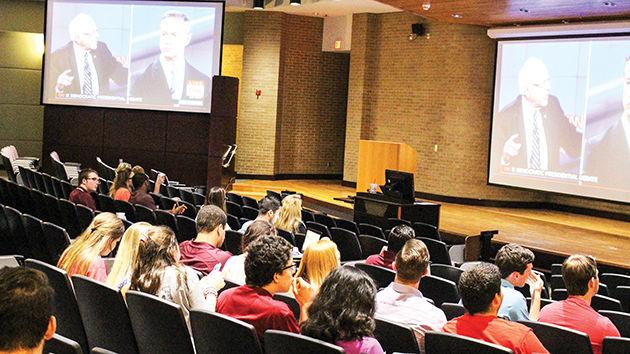The first Democratic Primary national debate featured plenty of highlights. Here are news editor Sam King’s five takeaways from last night’s verbal sparring.
1. Hillary vs. Bernie: While not openly hostile towards one another, the non-verbal sparring between the two was unmistakeable. At points either candidate would chuckle at each other’s response, followed by a rebuttal which began with a formal, “with all due respect.” The two front-runners were pitted against each other all night, emphasizing the differences between each candidate. Those major differences were most apparent in their differences on gun control and big bank policies.
2. A win for O’Malley: Among the lesser known candidates, the one who will likely see the greatest growth in his campaign’s success is Martin O’Malley. His answers were eloquent, his body language was confident and his policies seemed to resonate well with the audience. He pulled from examples of successes from his state, Maryland, and even talked about some difficulties in his time as governor. I predict O’Malley will see the largest jump in polling after his successful debut to the national audience the first Democratic debate offered.
3. Hillary can rest easy… for now: Clinton came into this debate as the front-runner and that put her in the vulnerable position of a candidate with the most to lose. No one questioned her experience, but she did have to prove to the audience she was likeable, confident and able to handle herself under scrutiny. The point of the debate where she could have faced the most problems — talking about her email scandal — was avoided from an out by Sanders when he said, “The American people are sick and tired of hearing about your damn emails.”
4. Forgettable responses from Chafee: When people reflect on which candidates said what in this debate, very little — if anything at all — will come to mind when thinking of Chafee. There were several sound-byte worthy quotes from the evening, but very few came from Chafee. If people want clarification on his platform, they will most likely be forced to turn to Google because his responses were unclear. This debate could have been a very helpful tool for his campaign, and while I don’t think it set him back any, it certainly didn’t help much, either.
5. Webb the afterthought: Many voters went into the debate unsure of who Jim Webb was, and a lot of those people left with the same question. When he wasn’t begging to be called on — at one point he went so far as to tap Sanders on the shoulder — he wasted time criticizing moderator Anderson Cooper for how he ran the debate. While Webb may have received less time than the other candidates, he shouldn’t have wasted the time complaining because that’s what voters most saw, instead of his policy stances.









